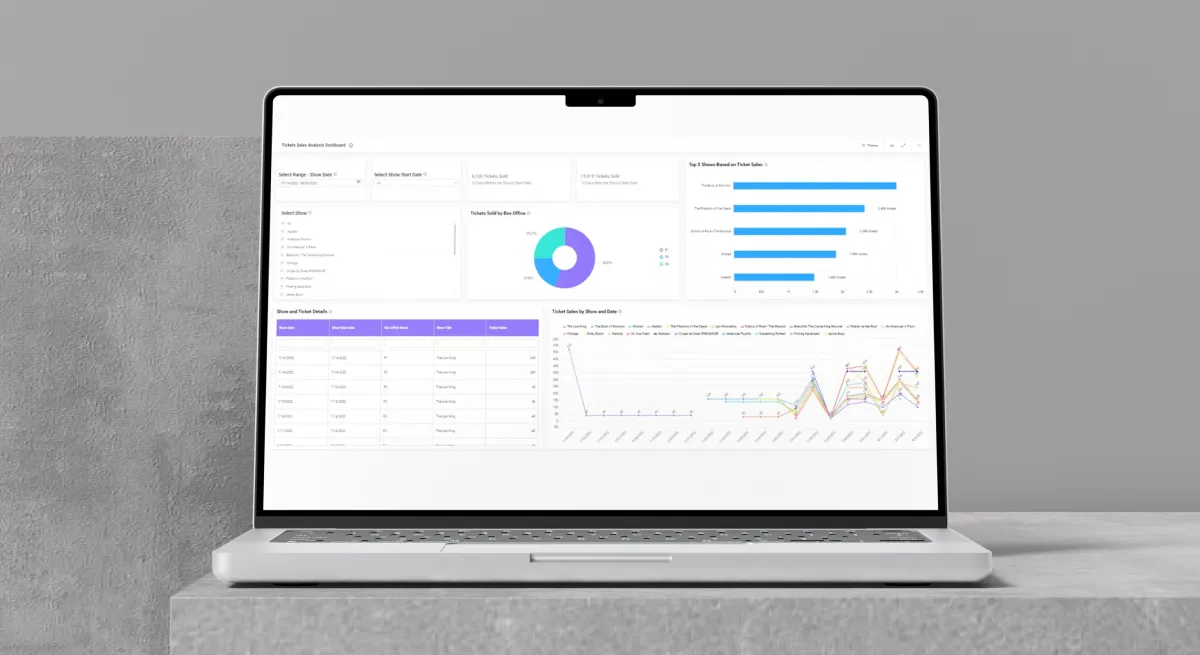In the realm of ticket-selling platforms, the importance of data cannot be overstated. The ability to comprehend customer behavior, identify ticket sales patterns, and stay ahead of competitors can make or break your success.
This is precisely where the power of predictive analytics comes into play. By harnessing data, employing statistical algorithms, and utilizing machine learning techniques, you can uncover valuable insights that shape your platform strategy and drive sales.
In this article, we will dive into the ways you can leverage predictive analytics to your advantage, as well as the potential strategies and challenges to keep in mind. So, let us embark on this journey and discover the significance of predictive analytics in the ticketing industry!
The Role of Predictive Analytics in Ticketing
Predictive analytics in ticketing refers to the practice of using historical and real-time data, statistical modeling, and advanced algorithms to forecast future outcomes and make informed decisions in the ticketing industry. It involves analyzing vast amounts of data related to ticket sales, customer behavior, market trends, and other relevant factors to identify patterns, trends, and correlations.
By leveraging predictive analytics, ticketing platforms can anticipate demand, optimize pricing strategies, personalize marketing efforts, and improve overall operational efficiency.
The goal is to accurately predict ticket sales, customer preferences, and market dynamics, enabling organizations to make data-driven decisions that enhance revenue generation, customer satisfaction, and business growth.

Enhanced Demand Forecasting
Predictive analytics serves as a powerful tool for projecting various aspects of events and ticket purchasing. By analyzing historical data, market trends, and customer behavior, predictive analytics enables organizations to make accurate predictions about the future.
This empowers ticket platforms, venues, and event managers to optimize inventory, allocate resources efficiently, and adjust pricing strategies accordingly. With improved forecasting, businesses can avoid inventory shortages or excesses, reduce costs, and maximize revenue potential.
Leveraging Historical Ticket Data and Patterns
A fundamental aspect of predictive analytics is utilizing historical data and patterns. Through analyzing past ticket sales, customer behavior, and market trends, organizations can uncover valuable insights that inform their future strategies.
Historical data allows for the identification of recurring patterns and trends, enabling ticketing platforms to make more accurate predictions about future demand, pricing, and inventory management.
Organizations can use this information to optimize ticket availability, anticipate peak periods, and allocate resources effectively. This data-driven approach helps in minimizing risks, maximizing revenue, and enhancing overall operational efficiency. Leveraging historical data and patterns through predictive analytics empowers ticketing platforms to make well-informed decisions and stay ahead in a competitive market.
Incorporating External Factors for Accurate Predictions
Considering external factors in predictive analytics is crucial for achieving accurate predictions. While historical data provides valuable insights, external factors such as economic conditions, weather patterns, cultural events, and competitor activities can significantly impact ticket demand.
By considering these external factors, ticketing platforms can enhance their predictive models and make more precise predictions. For example, analyzing weather forecasts can help anticipate attendance at outdoor events, while monitoring economic indicators can inform pricing strategies.
By integrating relevant external factors into the predictive analytics framework, organizations can gain a comprehensive understanding of the factors influencing ticket sales and adjust their strategies accordingly.
This proactive approach leads to more accurate predictions, improved decision-making, and better alignment with market dynamics, ultimately enhancing business performance in the ticketing industry.

Optimizing Pricing Strategies
Predictive analytics empowers organizations to optimize pricing strategies by leveraging historical and real-time data, customer behavior analysis, and market trends.
Identifying pricing patterns, demand elasticity, and competitor pricing, can help businesses make data-driven decisions to set optimal prices that maximize revenue while remaining competitive.
Plus, this allows organizations to strike the right balance between attracting customers and maximizing profitability, ultimately driving sales and improving overall pricing efficiency.
Dynamic Pricing Based on Demand Fluctuations
Predictive analytics can improve your pricing strategy. By continuously monitoring and analyzing real-time data on customer demand and other relevant factors, organizations can adjust ticket prices in response to fluctuations in demand.
The dynamic ticketing approach allows ticketing platforms to capitalize on periods of high demand by increasing prices, maximizing revenue during peak times.
Conversely, during periods of low demand, prices can be lowered to attract more customers and ensure optimal ticket sales. By employing dynamic pricing based on demand fluctuations, organizations can effectively balance supply and demand, optimize revenue generation, and remain agile in a dynamic market.

Improving Customer Experience
Personalized Recommendations
Predictive analytics plays a crucial role in enhancing the customer experience. One way this is achieved is through personalized recommendations.
By harnessing the power of customer data, ticketing platforms can tailor their suggestions to individual preferences and behaviors. This allows for a more personalized and relevant ticket-buying experience, increasing customer satisfaction and engagement.
Additionally, ticketing platforms can analyze customer data such as past purchases, browsing history, and preferences to suggest events, seating options, or even bundled packages that align with the customer's interests.
Personalized recommendations enable platforms to enhance upselling and cross-selling opportunities, providing customers with complementary offerings that match their preferences and potentially increasing the average transaction value.

Minimizing Ticket Fraud and Scalping
Another crucial aspect of improving the customer experience in ticketing is the mitigation of ticket fraud and scalping. Predictive analytics plays a vital role in detecting fraudulent activities through data analysis.
By monitoring patterns, anomalies, and suspicious behavior, platforms can identify potential cases of ticket fraud. This allows for timely intervention and preventive measures to protect genuine customers from falling victim to fraudulent practices.
Implementing robust security measures, such as authentication processes, ticket verification technologies, and anti-scalping mechanisms, helps in safeguarding the integrity of ticket sales.
By utilizing predictive analytics to combat ticket fraud and scalping, ticketing platforms can ensure a more secure and trustworthy ticket-buying environment, ultimately enhancing customer confidence and satisfaction.
Streamlining Operations and Resource Allocation
Efficient Inventory Management
A key component of streamlining operations in ticketing is efficient inventory management. Predictive analytics enables organizations to analyze historical ticket sales data and optimize stock levels accordingly.
With the ability to identify patterns and trends in ticket demand, platforms can ensure they have the right amount of tickets available at any given time, minimizing the risk of overbooking or underutilization. This data-driven approach to inventory management helps organizations maximize revenue potential and improve overall operational efficiency.

Staffing and Resource Allocation
Effective staffing and resource allocation are essential for smooth operations in the ticketing industry. Predictive analytics allows organizations to forecast demand and schedule appropriate staff levels accordingly.
Through analyzing historical data, customer behavior, and ticket sales patterns, platforms can predict peak periods and allocate staff resources accordingly, ensuring optimal customer service levels.
Additionally, predictive analytics helps in allocating other resources, such as venue facilities and customer support, based on predicted ticket sales and demand.
This proactive approach to staffing and resource allocation helps organizations streamline operations, enhance customer satisfaction, and optimize resource utilization for improved efficiency.
Examples of Successful Predictive Analytics Implementation
Predictive analytics has revolutionized ticketing businesses, enabling them to make data-driven decisions and gain a competitive edge. We’ll explore some real-world examples of successful predictive analytics implementation in the ticketing industry.
These cases will showcase how organizations have leveraged predictive analytics to optimize pricing strategies, enhance customer experiences, streamline operations, and achieve remarkable results
NBA
The strategic use of predictive analytics in ticket sales has proven successful for the Orlando Magic, enabling them to generate impressive revenue in a market that ranks 20th in size. Despite challenges like the 2011 NBA lockout, which incurred significant losses for players and owners, the Magic managed to increase their ticket revenue by approximately 50% in the first year alone.
Anthony Perez, the vice president of business strategy for the Orlando Magic, highlighted the substantial impact of analytics on their revenue growth. Over the course of the past three years, their ticket revenue has seen a remarkable growth of around 75%, underscoring the effectiveness of their approach.

Ticketmaster
Predictive analytics plays a pivotal role in Ticketmaster's dynamic pricing approach. By gathering and analyzing data on customer behavior, market trends, and external influences, Ticketmaster gains valuable insights that inform their pricing strategies.
For example, if Ticketmaster identifies a high demand for a particular event, they may increase ticket prices to capitalize on the increased interest. Conversely, if an event is not selling as well as anticipated, Ticketmaster can lower ticket prices to stimulate demand and boost sales.

NCAA
A study titled "Data-Driven Sports Ticket Pricing for Multiple Sales Channels with Heterogeneous Customers" by Robert Easley and Ovunc Yilmaz explored price optimization using predictive analytics. They worked with an NCAA Division I football program, analyzing ticket sales data and identifying audience segments within season tickets and single-game tickets.
The research revealed that factors such as viewing angle, distance to the field, and weather conditions influence audience preferences. Surprisingly, as seat availability in a section decreased, fans were less likely to choose seats in that section, indicating that they perceived marginal seats as less valuable. The study also found varying price sensitivity among fans, with some preferring the best seats while others opt for affordability.
Based on this data, a pricing tool was created to model optimal prices for each seat, considering variables like seat location, opponent, and game details. The tool is flexible and can be applied by any sports team with historical purchasing data to maximize revenue. It not only focuses on revenue generation but also helps identify prices that engage fans and encourage participation effectively.
Predictive Analytics Tools
Predictive analytics tools have revolutionized the ticketing industry by providing invaluable real-time insights into a wide range of business activities. Analytics tools enable ticketing professionals to make informed predictions and decisions regarding resource allocation, stock replenishment, and optimal timing for marketing campaigns.
Leveraging historical data analysis, these tools offer deep insights into customer behavior and patterns, empowering ticketing professionals to maximize their operational efficiency and revenue generation.
Some predictive analytics tools for ticketing include:
RealTime Event Analytics: Ticket Spice
TicketSpice offers advanced analytics and reporting for data-driven decisions. Their tool lets users track visitors, sales, refunds, and conversions instantly. It also provides integration with financial tools, as well as access to online graphs and attendee lists.

Event Data Analysis: Eventbrite Analytics Tool
Eventbrite's analytics tool provides customizable charts and reports to help clients gain valuable insights to make informed decisions. It allows users to group sales by ticket type, set date ranges, and measure quantity or revenue. Upcoming features include additional grouping options, data filters, multi-event reporting, attendee geography tracking, and promotional traffic analysis.
Embedded Ticket Sales Analysis: BoldBI
Bold BI's embedded ticket sales analysis dashboard provides comprehensive insights, including ticket sales, best-selling shows, and box office data. It lets event organizers and venue managers optimize their ticketing operations, target audiences effectively, forecast future sales, and enhance customer satisfaction.

Challenges and Limitations of Predictive Analytics
Data Availability and Quality
While predictive analytics offers immense potential, there are challenges and limitations that organizations face in its implementation. One such challenge is the availability and quality of data.
To derive accurate insights, organizations must collect and cleanse relevant data from various sources, including ticket sales, customer demographics, and market trends. This process requires robust data collection methods and effective data management practices.
Additionally, organizations must address data privacy concerns, ensuring that sensitive customer information is handled securely and complies with privacy regulations.
Complexity and Implementation Hurdles
The complexity of predictive analytics implementation poses another challenge for organizations. It requires overcoming technical and organizational hurdles. Technically, organizations need the right infrastructure, tools, and expertise to analyze and interpret the data effectively.
Moreover, integrating predictive analytics into existing systems and processes can be a complex task. Organizations also face organizational challenges, such as ensuring buy-in from stakeholders and training staff to effectively utilize predictive analytics tools.
Overcoming these hurdles often requires a well-defined implementation strategy, clear communication, and ongoing support from leadership.
While there are challenges and limitations in implementing predictive analytics in the ticketing industry, partnering with a software development company can help you overcome these hurdles.
By collaborating with a trusted and experienced team like Softjourn, you can address data availability and quality concerns, navigate the complexities of implementation, and unlock the full potential of predictive analytics for your ticketing operations.
Our expertise in ticketing solutions and data analysis will guide you toward transformative outcomes. Take the step towards optimizing your ticketing operations by reaching out to us today.
Future Trends and Opportunities
Advancements in Machine Learning and AI Technologies
The future of predictive analytics in the ticketing industry looks promising with advancements in machine learning and AI technologies. These technologies are evolving rapidly, enabling more sophisticated analysis and modeling capabilities.
Organizations can expect enhanced predictive accuracy, faster processing times, and improved decision-making as machine learning algorithms become more refined. The integration of AI technologies into predictive analytics opens up new opportunities for uncovering deeper insights, automating processes, and enhancing overall operational efficiency.
Integration of Predictive Analytics with Other Technologies
The integration of predictive analytics with other emerging technologies offers exciting possibilities in the ticketing industry. For instance, combining predictive analytics with the Internet of Things (IoT) can enable real-time data collection from connected devices, leading to more accurate demand forecasting and dynamic pricing.
Additionally, integrating predictive analytics with blockchain technology can enhance ticketing security, prevent fraud, and provide transparent and immutable records of ticket transactions.
These synergistic collaborations between predictive analytics and other technologies hold great potential for improving customer experiences, optimizing operational processes, and driving innovation in the ticketing ecosystem.
Potential Applications in the Future of Ticketing
Looking ahead, there are numerous potential applications and benefits for predictive analytics in the future of ticketing. Organizations can expect more personalized recommendations and tailored experiences for customers through advanced customer segmentation and behavioral analysis.
By harnessing the power of predictive analytics, ticketing organizations can gain a competitive edge, enhance customer satisfaction, and unlock new revenue opportunities. As the industry evolves, predictive analytics remains a key driver of success. Embracing this transformative technology can help you pave the way to success.











